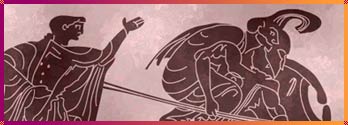 |
|||||||||||||||||||||||||||||||||||||||||||
|
Rome
Aeneas tightly clasped a golden tree bough in his hand. It would give him safe passage on his terrible journey — to the underworld to seek out his father, Anchises. The Trojan hero followed his guide, the wise woman, the Sibyl of Cumae, deep into the dark forbidding cave that led to the land of the dead. They traveled the road of lost spirits, shadows adrift, and frightening horrors of disease, death, and discord until they reached two rivers. Charon, the ferryman of the dead and buried, reluctantly rowed them across while Cerebus, the three-headed dog of hell, furiously barked at these visitors from the world of the living. Aeneas kept going. He passed through places of sorrow and punishment until finally he reached his destination: the Elysian Fields, the beautiful eternal home of those who had lived a good life. His father was waiting. Anchises embraced his son. Then he showed him a wondrous vision: the future! Aeneas looked in awe at his own descendants to come. He saw that they would do great deeds and become a great people, the Romans. Aeneas was dazzled by the revelation. He held his father close one more time, then returned to the land of the living — and set sail for Italy. The Romans renamed the Greek gods and goddesses, and redirected their myths. Greek myths could overlap, interlock, or even contradict each other. They served many purposes. Roman myths were for the sake of Rome. They were used to re-create the city's history, for example, its descent from Aeneas, to explain Roman society and to reinforce its rules, rites, and customs. |
||||||||||||||||||||||||||||||||||||||||||

